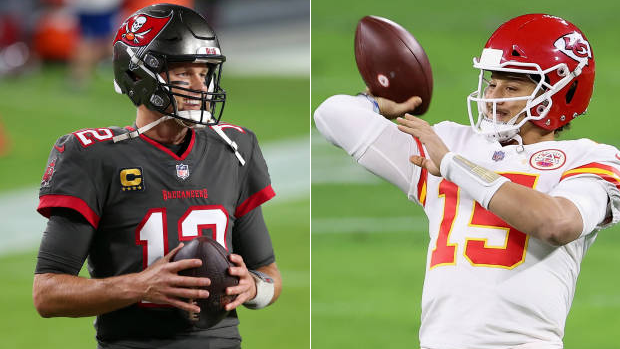Feb 3, 2021
The Super Bowl is about far more than Brady versus Mahomes
Quarterbacks may be the most important players on any football team, but they are not the entire team, Dave Naylor writes.
By Dave Naylor

The National Football League has become more and more quarterback-focused over the past two decades.
Most of the league’s all-time quarterback marks are held by players from the 2000s, as the relaxing of rules to favour offence and the non-stop evolution of the position have both fed the trend.
Teams consistently invest top draft picks at quarterback, even when players are far from sure bets (EJ Manuel, Josh Rosen) to the point that 23 of 32 NFL teams this past regular season started the year with quarterbacks taken in the first round of the draft.
Gone is a league that once had stars such as Jeff Garcia, Tony Romo and Kurt Warner – none of whom were drafted.
With quarterbacks carrying so much weight, it seems as though every NFL storyline is built around them – sometimes to an absurd extent.
Romo, now a CBS analyst, illustrated that point last week in assessing the quarterback matchup in this year’s Super Bowl between the Kansas City Chiefs and Tampa Bay Buccaneers.
"This is the biggest game Patrick Mahomes will ever play in for the rest of his career,” Romo said on a Zoom call with reporters last week. “He has to win this game. If he loses this game, he cannot catch Tom Brady, in my opinion."
Unless Romo was referring to an upcoming game of golf or tennis between Brady and Mahomes, this is ridiculous.
Quarterbacks may be, by far, the most important players on any football team, but they are not the entire team. An NFL game involves 48 players on each side, and there is no sport where the weakest link in a chain can ruin everything quite like it can in football.
So discussing quarterbacks as if they’re on opposite ends of swords in a duel ignores two ratter obvious points. For one, they’re never on the field at the same time. Secondly, they don’t play defence or special teams – areas where mistakes are often the difference between and win and a loss while quarterbacks watch from the sideline.
Quarterbacks can greatly influence the outcome of games by the way they manage the action when they’re on the field and the decisions they make about which risks to take and when, but making them solely responsible for the result of a football game is silly.
Let’s take Romo’s example about Mahomes needing to win this Super Bowl game to ever catch Tom Brady as an all-time great to the extreme.
What if Mahomes goes 29-of-40 for 374 yards with three touchdown passes, no interceptions and runs for 68 yards, while Brady goes 16-of-33 for 179 yards and a pick, but the Buccaneers win? That can happen because this is football and not quarterback showdown.
Evaluating the game purely on quarterback play makes it seem like defences are generic white noise against which all quarterbacks face the same challenges. That, of course, is completely wrong.
All of this echoes the silly arguments about measuring the greatness of quarterbacks by the numbers of Super Bowl rings they have. Sure, that’s part of what counts, but it’s not the only thing and it's not even the most important thing, depending on the player and his circumstances.
Brad Johnson, Trent Dilfer and Jeff Hostetler all won a Super Bowl. Dan Marino, Jim Kelly and Warren Moon didn’t.
Brady lost a Super Bowl ring when David Tyree caught a ball by pinning it to his helmet. He won one when Malcolm Butler intercepted Russell Wilson at the goal line. The point being: Brady didn’t have a anything to do with the play that decided two Super Bowls in which he was a starting quarterback.
Good quarterbacks win more games than bad quarterbacks. Over time, the wins are going to add up for the great ones who have a way of raising the play of all those around them. But saying a quarterback’s legacy will be forever altered if his team doesn’t win a particular game is silly.
Romo ought to know that better than most as a guy who often walked off the field as the better quarterback in defeat. He never made it to a Super Bowl, while much lesser quarterbacks of his era (like Rex Grossman) did.
